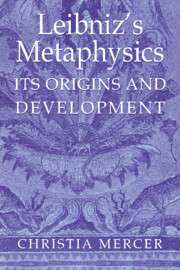Book contents
- Frontmatter
- Contents
- Acknowledgments
- References to Leibniz's works
- Introduction: first truths and half truths
- PART ONE METAPHYSICS OF METHOD
- PART TWO METAPHYSICS OF SUBSTANCE
- PART THREE METAPHYSICS OF DIVINITY
- PART FOUR METAPHYSICS
- Appendix I (Not exactly) First truths
- Appendix II Leibniz's original assumptions
- Bibliography
- Index Locorum
- Index
Appendix I - (Not exactly) First truths
Published online by Cambridge University Press: 12 March 2010
- Frontmatter
- Contents
- Acknowledgments
- References to Leibniz's works
- Introduction: first truths and half truths
- PART ONE METAPHYSICS OF METHOD
- PART TWO METAPHYSICS OF SUBSTANCE
- PART THREE METAPHYSICS OF DIVINITY
- PART FOUR METAPHYSICS
- Appendix I (Not exactly) First truths
- Appendix II Leibniz's original assumptions
- Bibliography
- Index Locorum
- Index
Summary
I offer here a list of the fundamental tenets of Leibniz's mature philosophy as they are presented in the First truths of 1689, the Discourse on metaphysics of 1686, and related texts. For the sake of convenience, it will be helpful to present them here and offer an extremely brief summary. There is disagreement among scholars about the precise way to formulate some of these doctrines. I have tried to keep the controversial issues to a minimum. I present them here in the order in which they appear in First truths.
• 1. The concept-containment account of truth.
In First truths, Leibniz writes:
the predicate or consequent is always in the subject or antecedent, and the nature of truth in general or the connection between the terms of a statement, consists in this very thing, as Aristotle also observed. The connection and inclusion of the predicate in the subject is explicit in identities, but in all other propositions it is implicit and must be shown through the analysis of notions; a priori demonstration rests on this.
In other words, the account of truth claims that a categorical, affirmative proposition, whether singular or universal, is true just in case the concept of its predicate is contained in the concept of its subject. See also Discourse on metaphysics, 8.
- Type
- Chapter
- Information
- Leibniz's MetaphysicsIts Origins and Development, pp. 473 - 476Publisher: Cambridge University PressPrint publication year: 2001



